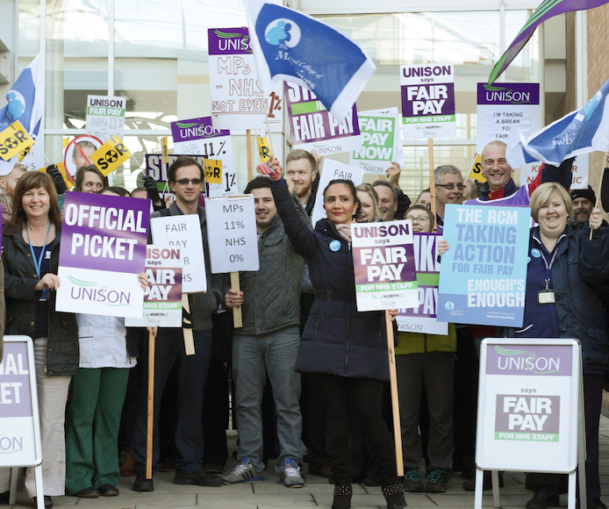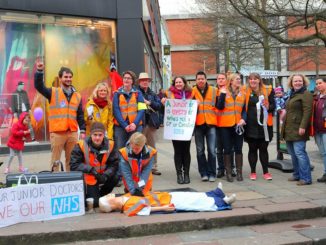
Pickets at Norfolk and Norwich University Hospital ,
Roger Blackwell – Licence CC BY-SA 2.0
Have you noticed something? Whether it is the nurses, who are no longer striking, the junior doctors, about to spend three days on the picket line in pursuit of their 35% pay claim, or the consultants, threatening a two-day walk-out which they may choose to spend topping up their income in the private sector rather than shouting slogans outside their hospital – it’s all about them.
They are exhausted, they are suffering from ‘burn-out’, their work brings on mental health issues. Their pay has – hardly uniquely – lagged way behind inflation, their working conditions are intolerable. No one respects them or their hard work, they’re threatening to follow their zillions of colleagues who have left for a better work-life balance by an Australian beach. By now, you can probably recite their list of grievances by heart. You might also have figured out that someone, quite a lot of someones, are missing from the picture.
Our NHS? Not really; it feels a lot more like their NHS
Yes, it’s you and me – the patients. Every now and again, some highly articulate medical representative is prompted by a helpful interviewer to say that of course they regret the inconvenience to those whose operation or cancer treatment will be postponed, but it’s all in a greater cause. Real live patients rarely feature as more than a distant afterthought. Our NHS? Not really; it feels a lot more like their NHS.
I write as someone who recently, and reluctantly, spent eight days in three instalments on the other side of this noble front line. I emerged with a painfully pinned and subsequently infected left ankle, a sturdy metal frame to hop around on, and the echoes of a plea that I had screamed silently to myself every day of my medical detention: will someone please tell me what is going on?!
There is a neat little mantra, applied to situations as different as medics dealing with patients in the NHS to any hint of peace talks on Ukraine, which promises ‘nothing about you, without you’. The principle here is that those at the centre of the action should be kept abreast of what is going on and given their say.
This was so very far from my experience at one of this country’s premier teaching hospitals that I mostly just lay back (in so far as the infernal hi-tech bed would allow) and let everything happen.
I was left to hope against hope that somewhere a great mind was at work, handing down decisions to an ever-changing cast of medical and other staff – decisions that were truly in my, and my fellow patients’, best interests.
As I say, I hope that was so, because it was not always evident. Days came and went without anyone taking the slightest interest in why I was there. Admissions and discharges passed without my having any idea who had given the instruction, who was deciding what would be done, what had been done, or what medicine I was being given and why.
When I plucked up the courage to seek some answers, the questions were either waved away as the preserve of ‘the doctor’ – unnamed. Other information, even if it was as basic as my latest temperature and blood pressure readings, was divulged as grudgingly as a nuclear secret. Details of my ‘bowel movements’, on the other hand, and those of my fellow patients, were eagerly solicited within everyone’s hearing.
In the long corridor outside the ward hung what I (misguidedly) had assumed might be a message of goodwill towards patients. What it was, or at least read like, was almost the opposite: a message to staff, long on their contractual and professional rights, short on any obligations, and with an assurance that they should be treated with respect at all times. I may be wrong, but I don’t recall even the barest acknowledgement that the whole point of their efforts might actually be the patients.
This might help to explain why, on occasion, some of us patients could be, I regret to say, a little short on the respect. There were some cheery gems among the staff. But it was often hard for a hospital novice, such as I was, to divine who was responsible for what, and in particular who – if anyone – was in charge.
There seemed no routine beyond the four-hourly blood-pressure/temperature, and mealtimes. Day or night, there was a regular half-hour delay between someone pressing their buzzer and the arrival of the bed-pan or commode they had asked for. Sometimes they had to ask more than once; staff don’t like that.
The loos could have done with more attention to hygiene, their condition not helped by waste bins with sealed tops and pedals that few with a foot injury (this was an orthopaedic ward) could open. A malfunctioning bedside light, a loose hand grip by the loo, a slippery floor – these were perils, but always someone else’s problem, and as such rarely fixed. And just try getting a toothbrush or the wherewithal to wash your hands. I had been admitted as an emergency, had nothing for an overnight stay, and lost count of the times I had to ask for such basics.
More worrying were the actual, or near, mistakes. On two occasions – in just eight days, remember – I was almost given the wrong medicine. The first time, I noticed that one of the pills in my little paper cup looked much bigger than any I had been given before, so I asked what it was. It turned out not to be for me.
The second time, a nurse came over, all enthusiastic, saying I was due for an injection. When I asked what it was, it was something the doctor who had admitted me the previous day had instructed to be discontinued forthwith because of side effects. I saw him do it on his screen, but the change still hadn’t filtered through to the nurses on the ward nearly 24 hours later.
In terms of instructions, the computer was king. The system seemed crotchety and not everyone knew how to use it. But without a doctor’s instruction, on screen, nothing medical was done.
Once, there was an unexplained delay between a doctor inspecting my leg and the wound being dressed. The wait was apparently for a computer instruction. When I asked the nurse why the doctor had not just asked her to do the dressing, she said: ‘The doctors don’t talk to us; the doctors don’t talk to us at all.’ And, so far as I could observe from my limited stays, that was true. It may be peculiar to this particular hospital, even to this department, but the two carried on as though in different worlds.
The only people who seemed to know exactly what they were doing and why, were those who brought food and hot drinks – and those at the very top, the most senior consultants. I was fortunate enough, on just one occasion, to have one stop by my bed. It was after I had crossly asked her more junior colleague why no one had thought to tell me that my scheduled operation wasn’t happening for more than 24 hours after it had been scheduled – and no, it was nothing to do with strikes.
The next wave of these NHS strikes will soon be upon us. But very little that I saw during my stays will be remedied by more staff or more money. To me as a patient and a taxpayer, the evident waste of time and facilities has to be a cause for despair. Covid may have brought seven-day working, but this hospital at least has snapped back into a Monday to Friday routine, with consultant-lite nights and weekends.
As for the top-heavy, overpaid management so many staff complain of, that may be so. More conspicuous from this patient’s perspective, however, was the opposite: a patent lack of direction and basic order a gigantic machine such as a hospital surely needs, along with a basic recognition of what the hospital and its staff are there for. A recent study by the Institute for Government supports what I saw.
I veer between wishing someone would impose a hospital equivalent of martial law, with clear lines of accountability and discipline, and thinking that perhaps it is time for us patients to go on strike. The pity is that it might be quite a while before anyone in ‘their NHS’ actually noticed.
© Mary Dejevsky 2023 (with permission)
Mary Dejevsky is a writer, broadcaster, and former foreign correspondent in Moscow, Paris and Washington.



